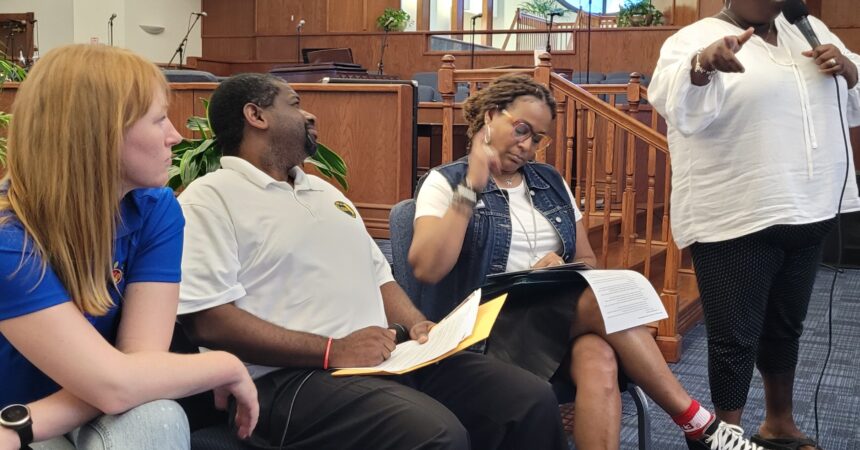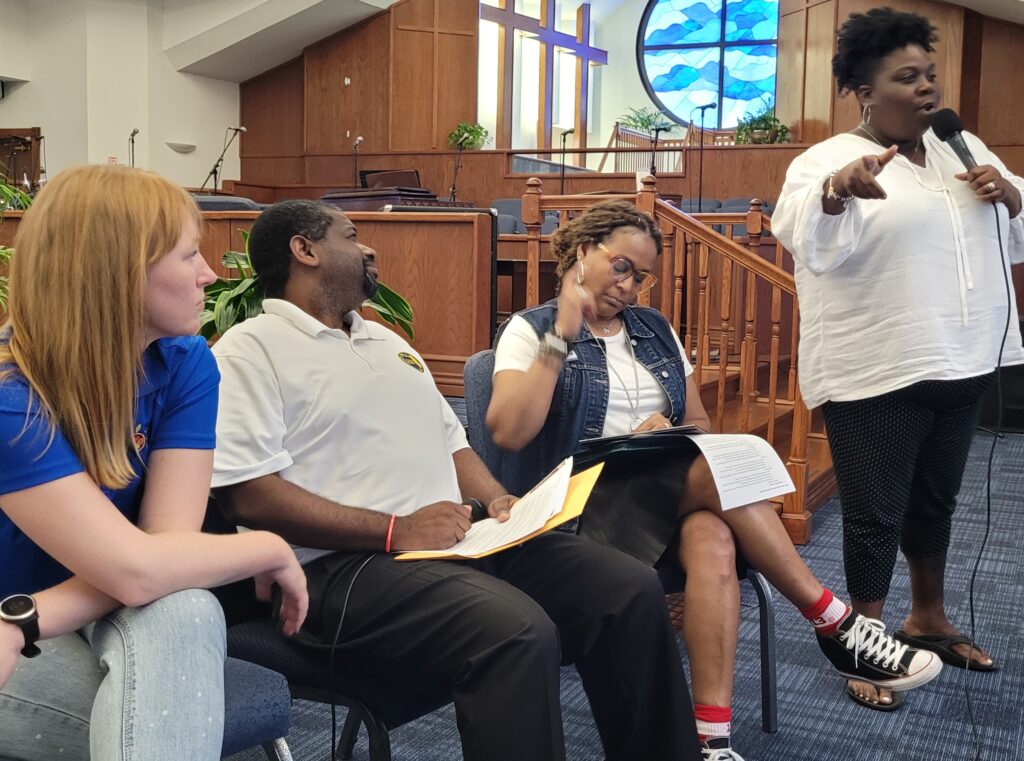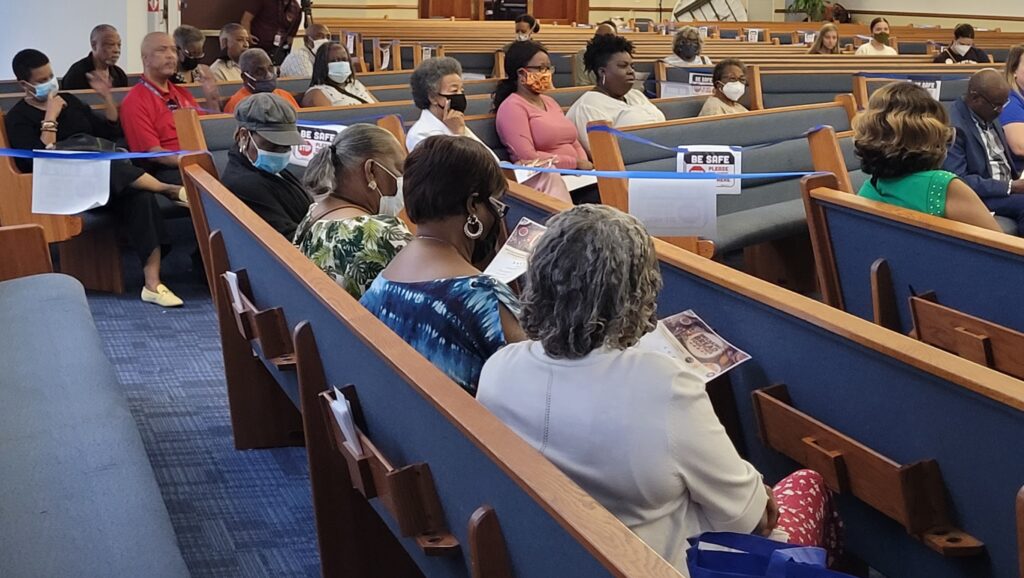
Staff gathers facts on food insecurity for county commissioners to consider

Photo by St. Clair Murraine

Photo by St. Clair Murraine
By St. Clair Murraine
Outlook Staff Writer
Many of the concerns sounded familiar. Folks talked about unemployment, lack of major businesses on the Southside and how the area is a food desert.
The crowd that gathered at Tabernacle Missionary Baptist Church last Wednesday night seemingly was there to vent. A few said it felt too familiar and were fearful that there won’t be any beneficial outcome.
Rev. Stanley Walker, pastor at Tabernacle Missionary Baptist Church, beseeched the panelists to bring real solutions.
“People are tired,” he said. “People are tired of coming to meetings and talking about needs. We all know what the needs are.”
This time will be different, promised Shington Lamy, director of Leon County Human Services and Community Partnerships. He had a staff taking notes, from which he said information will be compiled for Leon County Commissioners to consider at their budget workshop next month.
“We can’t do it all by ourselves,” Lamy said. “We are doing this collectively to determine how we invest in our communities (and) how we address some of these issues. I’m writing notes and my people are writing notes so that way we can come up with some thoughts and ideas based on what we heard here this evening.”
The meeting was the second in a series of nine fact-finding gathering that Lamy said will focus primarily on changing the designation of communities labeled as food deserts. Lamy was accompanied by Monique Van Pelt, CEO of America’s Second Harvest of the Big Bend, and Cecka Rose Green, Director of Children’s Services Council of Leon County.
Both women, like Lamy, were there to hear what residents in the area want to have fixed. Van Pelt and Green also had plenty to share with the group.
Van Pelt presented some not-so-surprising facts about food insecurity. In Leon County, for instance, she said 11 percent of the population is living with food insecurity but poverty affects 20 percent. Some of those counted in the data have jobs but aren’t earning enough to survive and be comfortable, she said.
That group makes up 49 percent of Leon County residents, meaning that hunger is prevalent in nearly one in every two families. She added that Second Harvest tries to address the issues by delivering about 130,000 pounds of food last year to the area.
But it’s not the complete answer, she said.
“That’s putting a Band-Aid on a larger issue,” she said. “Tonight we are hoping to learn what is the real problem that we should be tackling.”
Nicole Moltimore, community engagement Coordinator with the South City Foundation, pointed to one of the biggest issues – eating healthy. She made her point by telling of her involvement in a snack attack program to curb childhood obesity.
She was surprised to find out that many children don’t know about foods like celery, kiwi, and other fruits and vegetables. She didn’t always get support from parents, she said, explaining a scenario where a child discovered celery and peanut butter.
It angered the parent.
“I’ve never been cussed so badly. She said, ‘who are you to introduce this to my child. My child is going in the grocery store and telling me she wants this nasty rabbit food,” Moltimore said. “If I want to buy my child a bucket of chicken and tell her to eat it that’s what I’m going to do.”
Children in the Southside are some of the hardest hit with food insecurity and hunger. Information gathered from the meeting will be added to data that her agency has already collected, Green said, adding that eradicating hunger and food insecurity concerns are among the top priorities for her agency.
“What better way to nurture than ensuring that there is enough food; quality food, healthy food,” she said.
The problem of not having sufficient food has gotten so bad that some families have developed a system of tracking free food distributions, said Talethia Edwards, president of Greater Bond Neighborhood Association. In some cases, she said parents are making salaries that are a few dollars more than what would qualify them for food stamps benefits, leaving them to make tough choices.
When commissioners receive the report from Lamy’s group, Commissioner Rick Minor would know some of the information first-hand. He attended the meeting and tried to reassure attendees that action will be taken.
“We want to work with you and your neighbors on long-term solutions to help lift food insecurity out of this community. Our vision for these meetings is to listen to all of you help give us directions on how we can take Griffin Heights, Bond, Providence, South City and help bring more nutritious foods into these communities.”
The schedule for the remaining community conversations about food insecurity:
May 16 – FAMU Grand Ballroom, 1628 South Martin Luther King Jr. Boulevard, 5:30-7 p.m.
May 23 – Bond Community Health Center, 1720 South Gadsden Street, 5:30-7 p.m.
May 24 – Walker Ford Community Center, 2301 Pasco Street, 5:30-7 p.m.
June 1– Lincoln Center, 438 West Brevard Street, 5:30-7 p.m.
June 2 – Tallahassee Spanish SDA Church, 4823 North Monroe Street, 6-7:30 p.m.
NOTE: Dinner provided by a different local restaurant at each meeting.







